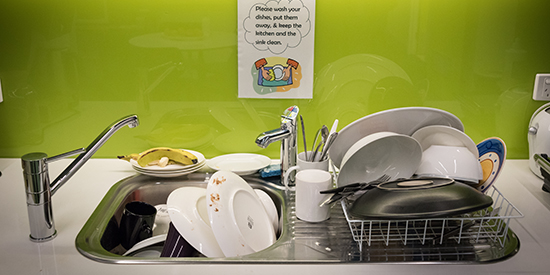Workplace kitchen wars: bosses urged to look past dirty dishes to address behaviour
Media releaseBattle lines drawn over the state of the office kitchen are likely to be the symptom of something much deeper than what’s on the dirty surface, a Deakin University organisational behaviour expert says.
Deakin Business School senior lecturer Dr Amanda Allisey said many workers would have experienced the frustration of piles of dirty dishes growing in the office kitchen sink with the offenders paying no attention to signs reminding staff that ‘your mother doesn’t work here so clean up after yourself’.
But she said employers should look beyond the mess in the kitchen, and consider the organisational culture and any ingrained systems that exerted a much stronger influence on employee behaviour.
“What experience tells us is that most often the level of control that an employee feels they have over their work and environment will have a far greater impact on staff satisfaction, and will have flow on effects to their behaviour and respect for the physical built environment,” Dr Allisey said.
Dr Alllisey conducts research into how organisations can create and maintain healthy and productive workplaces.
She said that when considering how co-workers cohabitated, the majority of disruptful behaviour was related to noise and a lack of privacy often attributed to open plan offices.
“Often people look for the simple answer, although the underlying driver of dissatisfaction in these environments is really a lack of control that workers feel they have when choosing where and how to conduct their work,” Dr Allisey said.
“In this sense, behaviours that are counter-productive, such as leaving dirty dishes behind, may be an attempt to exert some control over a workplace when an employee feels like they have none.”
Dr Allisey said addressing the bigger issue of workplace design means having an appropriate workplace strategy that considers all elements of work - the physical, psychological and technological.
“In transforming a workplace, the underlying culture of the organisation cannot be ignored,” she said.
“Increasing autonomy and trust in a workplace should be a primary starting point in any transformation project, and uncovering the drivers of workplace behaviour should be a primary focus – rather than taking the simplistic view that a particular individual is the culprit.
“Even in the most incredible workplace, if employees are not empowered to take control of their own work, the workplace will just be a more beautiful, albeit still dysfunctional, environment.”
Share this story

